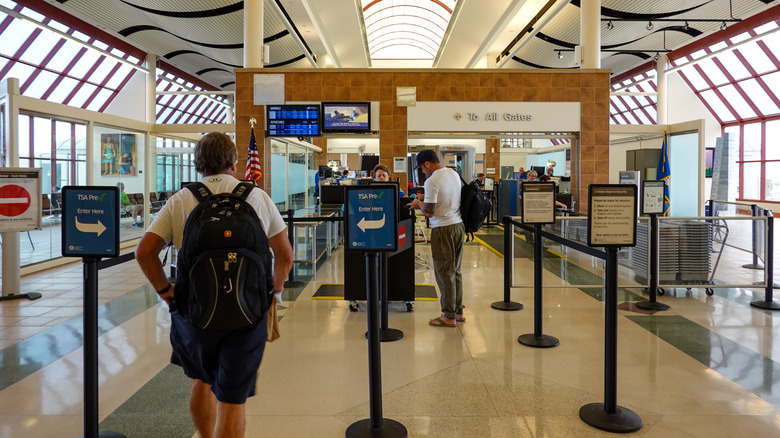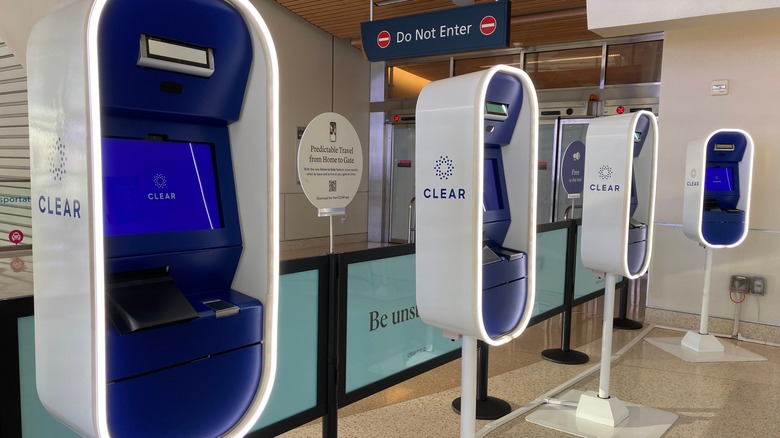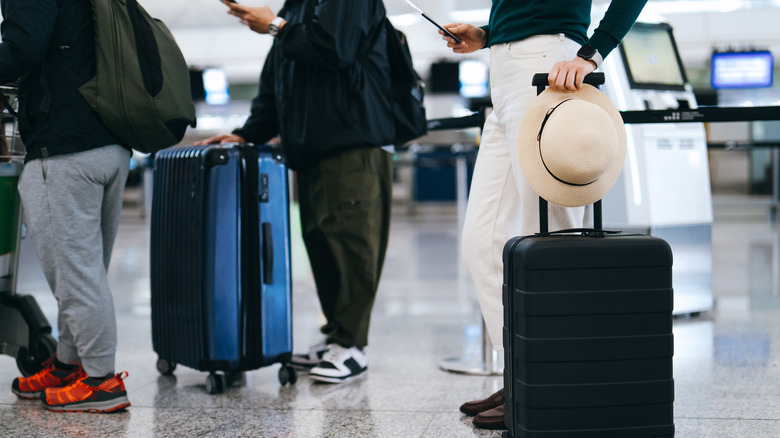Why Some Travelers With TSA PreCheck Are Getting Fed Up With Clear Users
TSA PreCheck is one of the best ways to get through airport security faster. Unfortunately, some users of the service have recently discovered that another program is slowing down their expedited screenings — and they're not happy about it. That other program is Clear, a private company that uses biometric data (think eye scans and fingerprints) to swiftly usher travelers through airport security.
So what does Clear have to do with TSA PreCheck? While they might appear to be two separate programs, travelers who sign up for both services are allowed to cut in front of other PreCheck users in line, which can defeat the purpose of getting TSA PreCheck at all. Some have voiced their complaints online, including @lifewithmitch1 on TikTok. "I have TSA PreCheck. There should only be one way for lower-risk travelers to get through the line, and that's not some private company coming in here and cutting everybody," he says in a clip, which has earned over 29,000 "likes" to date. Similarly, u/Evening-Editor-4014 on Reddit questioned the ethics of the queue-jumping service, garnering 238 upvotes.
Even legislators have noticed issues with Clear. In California, lawmakers approved a bill to put an end to the line-cutting in the state's airports. The bill's goal is to create separate lines for Clear users that won't disrupt the flow of TSA PreCheck and other security lanes.
Clear may also lack the security of TSA PreCheck
TSA PreCheck and Clear offer the same benefit: Spend less time in airport security. However, the way each program accomplishes this is different. People who enroll in TSA PreCheck undergo a background check to confirm they pose little risk to aviation security. Clear users, on the other hand, only need to show an official form of identification and pay the steep $189 annual fee (TSA PreCheck is less than half the price and lasts five years, for comparison) to be approved.
This can be infuriating for TSA PreCheck members who went through all the required steps to get approved for expedited screening. In comparison, Clear users can sign up and start using the service on the spot. And, given the low barrier of entry for Clear, it might not be as secure as PreCheck.
Clear has already been responsible for multiple security breaches. During one incident, a traveler carrying ammunition passed through Clear's checkpoint without proper identification before being caught by security officers. It's worth noting, however, that Clear users without TSA PreCheck must still remove their shoes, jackets, belts, laptops, and other items just like other travelers, even if they are allowed to cut in line. This reduces some security threats and helps keep potentially dangerous fliers out of airport terminals.
With Clear around, is TSA PreCheck even worth it?
If you have TSA PreCheck but not Clear, you might wonder if getting through security is a case of "if you can't beat them, join them." In other words, it may be tempting to sign up for Clear, too, to access its extra perks. While the decision to sign up for Clear is a personal one, it's important to remember that its users don't gain TSA PreCheck benefits unless they're enrolled in both services. Put simply, it's probably not a wise choice to forfeit PreCheck in favor of Clear.
Also, keep in mind that Clear doesn't always work as intended. For one, it's currently only available in just ver 50 airports across the U.S., leaving many domestic hubs without the company's presence. And at the ports that do offer Clear, the lines for the machine kiosks can sometimes be longer than the standard TSA lines.
If you're still feeling envious and want to try Clear, the most effective approach is to pair the service with a TSA PreCheck membership for the best of both worlds (and the option to choose the line that's truly the shortest). This is easier to do than ever before, thanks to TSA Precheck's partnership with Clear. The bundle for both services costs just under $200 for the first year, which is a reasonable price if you're a frequent flier.


